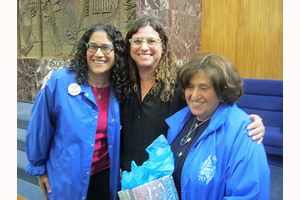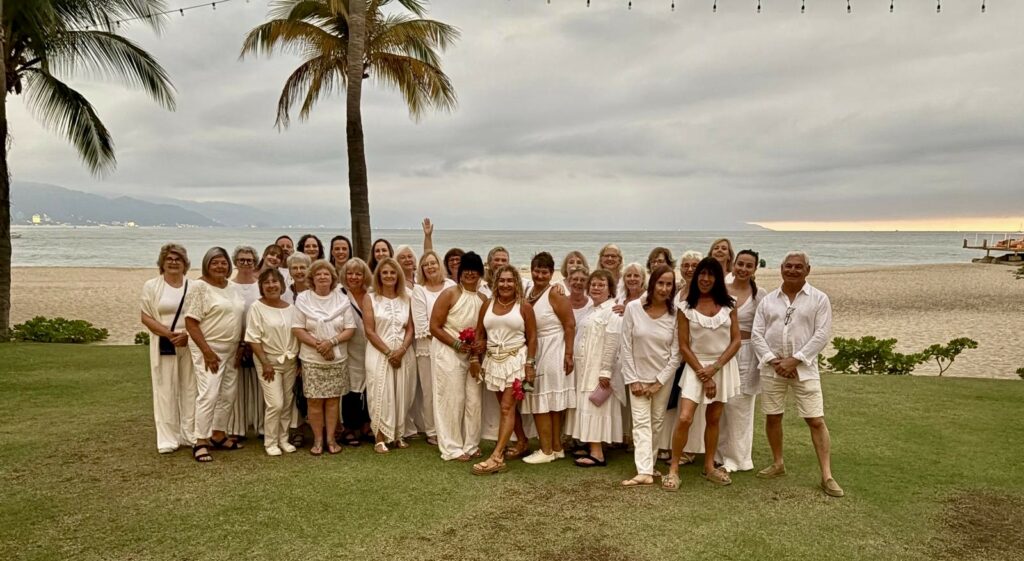Local News
Youngest survivor of Auschwitz calls for greater Holocaust education efforts

By MYRON LOVE
Angela Orosz-Richt is greatly concerned about the rising tide of Anti-Semitism in the world.
“It seems that the world hasn’t learned anything from the Holocaust,” she said. “There are still a lot of people who believe that all Jews are rich and influential, that we control Hollywood and the media. The internet is full of garbage and we are seeing rising levels and Anti-Semitic attacks in Germany and France and even Brooklyn.
“And it’s not just the old Anti-Semitism. The lies about Israel are outrageous.”
She further noted that half of Canadians can’t name one concentration camp and many don’t know what Auschwitz was.
“There is still so much more (in terms of education) that needs to be done,” she said.
Orosz-Richt has in recent years taken a leading role in Holocaust education. On Thursday, February 27, the youngest survivor of Auschwitz was in Winnipeg for the first time speaking on behalf of the March of the Living to a full house at the Shaarey Zedek Synagogue.
Her appearance in Winnipeg came at the behest of Carrie Shenkarow, chair of the Jewish Federation of Winnipeg’s March of the Living Committee.
Her father was an architect, her mother a well-educated young lady who was raised by French nannies. They met and fell in love and were married in 1943.
“Life was good at first,” she said. “My parents had an active social life. They didn’t see the clouds on the horizon.”
The Germans invaded Hungary in April, 1944, and, shortly after, Orosz-Richt’s parents were removed from their apartment to the ghetto and, on May 22, loaded with hundreds of other Hungarian Jews onto boxcars en route to Auschwitz. Orosz-Richt recounted the standard scenes of yelling, beatings, snarling German shepherds and the presence of Joseph Mengele on the platform designating the new arrivals for life or death.
Prisoners whose lives were spared had their heads shaven, were given uniforms and wooden shoes and were given numbers. “All their dignity was removed,” Orosz-Richt said. “They were no longer counted as human beings.”
While her father was worked to death, her pregnant mother somehow survived. She was first assigned to go through the belongings of victims for anything of value. Then, the five-months pregnant woman was put to work at hard labour building roads. What saved her was a reassignment to kitchen duties where she was able to scrounge potato peels.
When, at seven months pregnant, her condition was brought to the attention of Mengele whose staff subjected her to medical experiments consisting of injecting caustic substances into her cervix.
She was being encouraged by others in her barracks to abort her baby. “MY mother had a dream of her mother telling her to trust in God and not abort her child,” Orosz-Richt said.
She gave birth in the barracks with the help of another inmate who had had some medical experience. Orosz-Richt weighed one kilo at birth and her chances of survival were slim. Further upping the odds against her, almost immediately after birth, her mother had to go outside with the other prisoners for the daily roll call.
“She had to stand for three hours in freezing temperatures in flimsy clothing,” Orosz-Richt said. “It was the thought of her baby waiting inside that kept her going. She was afraid that I might have died before she got back.”
After liberation, mother and sickly child returned to Hungary where they lived with Vera’s mother. Vera found a doctor who looked after her baby. Mother and daughter escaped from Communist Hungary in 1948 and, shortly after, Vera married an older man who had lost his wife and daughter in the Holocaust.
“I grew up with loving and protective parents,” she said.
Orosz-Richt – who has four children of her own – noted that for the first twenty years, survivors didn’t want to talk about what happened to them. For the next twenty years, no one wanted to listen. It has only been in the last 30 years that Holocaust victims are talking and people are listening.
“Holocaust education is so very important,” she said. “Government needs to be involved and we need to start teaching the Holocaust at a younger age.”
Speaking on behalf of the Federation, Jessica Cogan, Israel and Overseas Chair, spoke about the importance of the March of the Living. “I consider the March of the Living a sacred duty,” she said. “My own participation I consider one of the most meaningful moments in my life. It shaped who I am today.”
She noted that the March of the Living began in 1988. Every year, thousands of young people from all over the world gather once a year at Auschwitz, walk the three kilometers from Auschwitz to Birkenau following in the footsteps of the death march near war’s end and show that the world that the Nazi’s failed in their “final solution”. Then they follow up with a trip to Israel where they celebrate Yom Hatzmaut and celebrate the miracle which is the rebirth of Jewish life in our ancestral homeland.
“Our goal this year was to send 20 students from Winnipeg on the March of the Living – 20 in ’20,” Cogan said. “I am happy to announce that we have exceeded that number. We will have 24 students going this spring.”
While the students contribute to the cost of the trip, Cogan noted, the March of the Living Committee raises funds to subsidize those costs.
“We want to thank our donors and encourage others to give,” she said.
Local News
Second annual Taste of Limmud to feature Jewish dishes from around the world

By MYRON LOVE Many words in English have multiple meanings. Take the word “taste” for example. There is the literal meaning – the sense of taste; it can also mean sample – or preferences. It can be a noun or a verb.
In “A Taste of Limmud,” the term is used both in its literal meaning – as a sampling of Jewish dishes from different parts of the world, as well as a prelude to our community’s upcoming 16th celebration of Jewish learning and culture, which is scheduled for Sunday, March 15.
This is the second year for “A Taste of Limmud,” which is coming up on Thursday, February 19. The event will be held at the Shaarey Zedek and will feature Jewish dishes from Argentina, Yemen, Turkiye, Aleppo and Eastern Europe, as well as Israel .
“We sold out last year for A Taste of Limmud,” reports Raya Margulets, Winnipeg Limmud’s newly appointed co-ordinator. “We had 120 participants last year. I am hoping to have 150 this year.”
The 2025 debut of “A Taste of Limmud” was actually Margulets’ introduction to the Winnipeg Limmud co-ordinating team. Originally from Israel, Margulets’ first position with the Jewish Federation of Winnipeg was in 2022 when she was appointed Hillel director – just a year after she had served as Hillel student president at the University of Manitoba.
She left her role with Hillel after about a year to participate in the ten-month online Israel 21c Digital Ambassador program, which is aimed at young people between the ages of 18 and 25. That program is part-time and casual, conducted remotely, intended to provide basic experience in digital communication and storytelling focused on everyday life in Israel.
“I spent a few hours a week working on simple digital content and social media, attended occasional online seminars, and participated in light collaborative projects,” Margulets reports. “The focus was on sharing positive, apolitical cultural stories rather than politics or advocacy.”
She was hired last year by the Federation to oversee our first Taste of Limmud – as a special project that was funded by the Jewish Foundation of Manitoba.
She was appointed at the beginning of September as Limmud Co-ordinator, replacing Florencia Katz, the original co-ordinator, who stepped away after 15 years in the role. Katz remains a member of the Federation staff as Director of Education and Engagement. She also has a focus on the PJ Library program.
“Florencia was a great mentor and is still a big help to me,” Margulets says.
She reports that the upcoming 16th annual Winnipeg Limmud will once again feature a wide and eclectic range of speakers. “I can confirm that all of our community’s rabbis – as well as Rabbi Benarroch – will be among the presenters,” she notes. “Rabbi Benarroch will be coming from Israel and be here in person.”
Also confirmed thus far are Yaron Deckel, an Israeli journalist and broadcaster, as well as Haskel Greenfield, Distinguished Professor of Anthropology, and Winnipeg’s own Rimon Art Collective. Collective members include young Jewish artists Mishelle Aminov Kosonovsky, Yael Freifeld, Etel Shevelev, Halley Ritter, and Shan Pullan
Stay tuned for further updates as to other 2026 Winnipeg Limmud presenters on this website or go online to keep up to date or register for programs at limmudwinnipeg.org.
Local News
Sharon Delbridge’s annual health & wellness retreats in Puerto Vallarta have become popular with many Winnipeggers

By BERNIE BELLAN Over the years we have revisited stories from time to time – to catch up with individuals who have made a mark in this city and to see where their lives have taken them since the last time we wrote about them.
One such individual is Sharon Delbridge, the youngest daughter of Sol and Rachel Fink, and younger sister to Percy, Shayla (Posen), and the late Sheldon Fink (who died all too young at the age 57 in 2021).
Myron Love has written many times about Sol and Rachel Fink, who continue to amaze for their vitality – with Sol now 101 and Rachel having just turned 99.
As Sharon notes in an email sent to me, “My parents work out everyday. Not at Rady anymore. They do exercise at home & in their condo gym (200 Tuxedo) Move their bodies daily. My mom leads her and my dad daily in movement. It’s incredible.
“They have been a huge inspiration to all of us.”
Aside from the fact that the Fink family was a very musical family, their penchant for fitness is clearly something that rubbed off on Sharon, in particular.
My own wife, Meachelle, who was quite the fitness fanatic herself in her day (not that she’s been put out to pasture quite yet), profiled Sharon for The Jewish Post & News in 2015. In that story, Sharon explained how she came to be one of the most popular and best known fitness instructors, not only at the Rady JCC – where her classes in a wide variety of different areas, were – and still are, extremely popular, but at many other venues throughout Winnipeg.
Here’s part of what Sharon told Meachelle about how she came to teach so many different types of fitness classes:
“I’ve been into fitness my whole life. I come from a very musical family but also a family that always works out. When I was in my 20s I was teaching aerobics for several years as a part-time job while in university. When I had my three children (Milan, Jared and Cassie Ackerman) I ran a hand-painted clothing business in my home called Milan Designs, and I sold to ladies’ and children’s stores all over Canada.
“I was always working out and have loved fitness classes. I went back and got more certifications in my 40s. I’m certified to teach many specialties and have been actively teaching at the Rady for over 10 years. I now specialize in women’s boutique fitness: Zumba, Yoga and Barre classes. The three specialties blend beautifully together and I have a big following of people from all over Winnipeg that come to my classes. I have every Zumba certification that’s available: Zumba, Zumba Gold (for seniors), Zumba Toning (with weights), Zumba Aqua (in water), Zumba Step and Zumba Sentao (using steppers and chairs).
“I’ve taken many yoga certifications through the past 10 years and I’ve been teaching Barre classes, which are the latest and hottest classes for women. I’m always taking new training in these three specialties to continue to stay fresh and always have new and exciting things to present to my class. That’s how I stay unique in my field. I’m always learning and always developing my classes to be the best they can be. I spend tons of time finding the best music and choreographing.
“I truly feel that if you work out and look after your body, you will always have a positive outlook on life. Exercise is a huge healer mentally and physically. I have seen so many incredible changes in women that come to my classes. They have transformed their bodies and live happier and healthier lives.”
It was a year after Meachelle’s article about Sharon that Sharon and her husband, Darcy, began going to Puerto Vallarta for the winter. As Sharon noted, “I started teaching at a Yoga studio the first winter we were here in PV. It’s easy to meet people & build community when you’re teaching snowbirds from everywhere
I love sharing my love for fitness & yoga & moving our bodies.”
But, for six years prior to making Puerto Vallarta her and Darcy’s winter home, Sharon had already been conducting annual one-week health and wellness retreats in Puerto Vallarta. She has continued to conduct those retreats every year since. The most recent retreat was held from January 25-February 1 at the Fiesta Americana All Inclusive Resort.
Here’s how Sharon describes the purpose of those retreats:
“For over 15 years, my Health & Wellness Retreat has brought together women of all ages to reconnect, recharge, and celebrate movement, friendship, and balance. Hosted at a beautiful all-inclusive resort, guests can truly make the week their own holiday experience. While primarily a women’s retreat, many now bring their husbands or partners who are welcome to participate as much or as little as they choose.
“Throughout the week, we offer seven daily classes ranging from sunrise meditation and yoga to toning, Zumba, yin yoga, and our signature Aqua Zumba — which transforms into a high-energy, joy-filled pool party. Each evening, we gather for sunset yoga and take time to celebrate the beauty of the day together.
“The retreat blends wellness with enjoyment, allowing guests to indulge in the resort’s wonderful restaurants and social atmosphere while still feeling strong, energized, and revitalized. It’s a balanced, uplifting experience where participants leave feeling nourished in body, mind, and heart, often forming lifelong friendships. This year, we were proud to welcome 40 participants.”

In the picture accompanying this article you might recognize several Winnipeggers. I asked Sharon how many Winnipeggers were participants in this year’s retreat?
The answer, she said, was the majority (31) were from Winnipeg, while six were from Las Vegas, one from Ottawa and two from Edmonton.
The last two years, Sharon also noted, another well known member of the Rady JCC staff, Dona Watts-Hastings, who’s a physiotherapist, also a yoga and Pilates instructor, has joined Sharon in conducting the retreat. Sharon adds that Dona’s physiotherapy clinic is inside the Rady JCC. Dona also brings some of her clients to the retreat.
I wondered though, how active Sharon is in teaching classes when she’s back in Winnipeg? Does she never tire of teaching so many classes? I wondered.
Sharon’s answer was: “Yes, I’m still in Winnipeg half of the year and I will always teach at the Rady… Zumba, sculpt , yoga & barre class – also spinning if they need me to sub. . I teach at Assiniboine park and other gyms, too. Every morning I teach and often sub other classes. Busy all spring & summer.”
Whew! It’s tiring just reading about everything Sharon does. If you would like to find out more about next year’s health & wellness retreat in Puerto Vallarta and how you might be able to join up, contact Sharon at sharon@freshsoulfitness.com.
To watch a video of what a typical day at the retreat consisted of go to freshsoulfitness
Local News
Jess Pudavick: artist and business executive

By MYRON LOVE Jess Pudavick is a rare individual in that she combines careers as an artist and a business executive.
I first became aware of Jess last summer when she was one of the artists/craftspeople with a display table at the Gwen Secter Creative Living Centre’s annual garage and craft sale. What piqued my interest was her focus on incorporating resins in her art pieces.
Last week, while interviewing Ms. Pudavick at Super-Lite Lighting on Waverley – I learned much more about the multi-talented Ms. Pudavick.
While I have a passion for art,” she notes, “I was not interested in becoming a stereotypical starving artist.”
The daughter of Stuart and Beth Pudavick joined the company (which her father acquired in the early 1980s (along with partners Simon Simkin and Allan Hochman) 17 years ago. Her brother, Ray, also joined the company 10 years ago, Jess notes.
At Super-Lite, Jess’s title is Custom Homes Lighting Consultant. She works with builders, designers and contractors to build the lighting for the home, as well as to choose the right lights for the space. She also manages the company’s social media and website.
“I enjoy working with my dad and Ray,” she says.”I also love what I do at Super-Lite. It is similar to my feelings about my art. You don’t know the end result when you start. It is nice to see something being built from nothing and seeing the end result – and knowing how happy the client is in the end.”.
As an artist, the graduate of Brock Corydon’s Hebrew Bilingual Program, Shaftesbury Collegiate and the University of Manitoba, recalls that she started at a young age. “As a kid,” she says, “I was always doodling and drawing cartoons.”
While she has worked with several different artistic media, she observes that what she likes about creating art with resins is the challenge.
“Resin is a temperamental material,” she points out. “When you start a project, you have no idea what the finished product will look like.”
She explains that there are two ways to work with resin. You can put traditional resin in a mold and wait 24 hours for the resin to dry. Or you can speed up the process by using a UV style resin and exposing the resin to UV rays.
“I prefer letting the resin dry naturally,” she says. “I find I have more control over it.”
Her resin-infused art comes in many forms. She produces earrings and necklaces, candle holders and ashtrays, dice and computer keys. She has also created resin-infused mahjong and rummikub tiles and even sets of dominoes with paw prints. A popular item, Jess says, is a custom coloured/theme wedding set of dominoes.
“People love them,” she says of the dominoes tiles.
(The latter reflects her own passion for dogs for which she is often a foster “parent”. She notes that she also creates resin-infused memory keepsake urns for the ashes/hair or fur of beloved pets – a product that is gaining popularity.)
Then there is the resin-infused coffee table that has a place of honour in her own home. “With my love of plants and resin, my partner and I took our existing coffee table, added various clippings of my own plants and created a fun resin-sealed table,” she recounts. “It really looks cool. It is unique. it attracts visitors’ interest. Every time I look at it, I see something different.”
Jess reports that generally sells her works of art through craft sales and her Instagram page (@thejesso09) for between $10 and $30. Her major source of sales though, she adds, is through word of mouth.
But Pudavick avers that she doesn’t do her art with an eye to sales.
“I create for myself, not for the approval of others. I find it relaxing – a good way to reduce stress. It’s also rewarding to see that others want something you have created.”
She strongly believes that enjoying your work is an important element in being happy. Equally important, she notes, – both in business and art – is to have satisfied customers.


